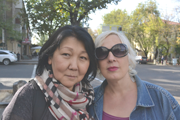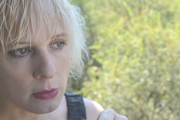Roksonaki to Tour Six US cities, including Washington, DC
The Central Asian Cultural Exchange presents Roksonaki – Kazakhstan’s most experimental neotraditionalist musical group – in a six-city tour of the US, March 4 through April 11, 2008.
Roksonaki formed in Almaty, Kazakhstan in 1990 under the direction of Ruslan Kara, who sought to create new music using motifs drawn from Eurasia’s indigenous religious traditions. Roksonaki pioneered the creation of arrangements that integrate ancient Kazakh instrumentation – the traditional kylkobyz, shankobyz, sazsyrnai and dombra – with contemporary rock music and jazz. Roksonaki’s fresh approach immediately attracted a lot of attention and they received the prestigious Aziia Dausy/Voice of Asia Award at the very beginning of their career.
Nauryz with Roksonaki is a series of residencies at U.S. universities and cultural institutions beginning March 4 touring the Kazakh band Roksonaki in a month-long celebration of the Central Asian holiday Nauryz. Nauryz with Roksonaki will stage a variety of performances, including mesmerizing concerts and musically accompanied workshops on traditional Kazakh culture:
- The Wisdom of Kazakh Fairytales
- Kazakh Folk Music and Instruments
- The Meaning of the Nauryz Holiday
A cutting edge educational experience, Nauryz with Roksonaki embeds visceral performance experiences in scholarly knowledge to create immediate meaning for audiences who have the uncommonly rare opportunity to learn about Central Asian culture directly from the source. The project takes a novel approach to teaching Americans about Central Asian cultures. Using face-to-face contact with cultural ambassadors from Central Asia, it exposes U.S. audiences to information about people from Muslim countries that is sensational without being sensationalist. Specially developed innovative educational materials – maps, descriptions of Kazakh fairytales, translations of Roksonaki songs, descriptions of traditional Kazakh musical instruments and Nauryz, a traditional Kazakh musical score, and Internet resources – provide intellectual reinforcement for the tour’s unforgettable and magical experiences.
Nauryz with Roksonaki also launches Mosaiqa Records, a new label featuring Central Eurasia’s most exciting performing artists. For more information, see www.mosaiqa.com.
Venues for workshop activities will be university classrooms, conferences, and schools. Workshops and concerts are arranged by the tour’s generous hosting institutions – Asia Society, the Chicago Cultural Center, Georgetown University, Northeastern Illinois University, Stony Brook University, Swarthmore College, the University of Chicago, University of Michigan, the University of Pennsylvania, the University of Richmond, and the University of Wisconsin-Madison. In addition, Roksonaki will headline a Gala Nauryz Celebration in Washington, DC on April 5, organized in collaboration with the Kazakhstan Embassy. For specifics on dates and venues please see www.cace.us or www.mosaiqa.com.
The participants are Dr. Helen Faller, an anthropologist who specializes in Central Asia and international exchange, Roksonaki – Ruslan Kara, Yerlan Sabitov, and Galymzhan Sekeyev – and Dr. Dina Amirova, ethnomusicologist. Roksonaki first exposed Americans to their virtuosity in 2002 when the group performed for two and a half weeks, sometimes playing with Yo Yo Ma, at the Smithsonian Institution’s largest ever Folklife Festival on the Washington, DC Mall.
Roksonaki’s concerts attracted thousands of devoted fans, who still rave about their music. One enthusiastic fan explained, “Roksonaki seemed to personify the concept [of the festival] – old traditions moving ahead into the future. The energy that the group put into their performances was immediately picked up and by the audience and sent back to them.” Another said, “I was very taken with them – their artistry, versatility and wide range of musical styles. What a breath of fresh air in popular music! I was one of the lucky ones to see them play with Yo Yo Ma. What a treat!” Roksonaki has treated audiences at many other festivals at home and abroad – in Canada, Germany, Turkey, and several former Soviet states.
Over time, Roksonaki’s musical inspirations have become increasingly shamanic. Their music is part of a Central Asian movement to return to pre-Islamic belief systems that is growing in tandem and sometimes in conflict with the region’s Islamic revival. It draws power from Kazakhs’ historically nomadic existence on the ancient Silk Road and influences from musical traditions spanning from North Africa to neighboring China.
Ruslan Kara still heads up Roksonaki. Currently the Artistic Director of Kazakstan Records, Ruslan composes all of Roksonaki’s music, sings, and plays guitar and percussion. The other two band members are master traditional musicians Galymzhan Sekeyev and Yerlan Sabitov. Roksonaki’s manager Dr. Dina Amirova, a renowned ethnomusicologist employed by the Aga Khan Trust for Culture to help preserve Kazakhstan’s cultural heritage, collaborated with Dr. Faller in creating the program’s ground-breaking educational materials. She will travel with the band and participate in the performances.
About Nauryz
Nauryz is a Pre-Islamic non-religious New Year holiday, celebrated for the month of March, in Central Asia and the Middle East coinciding with the Spring Equinox. “Nauryz” derives from the Persian “Novruz” meaning “New Day.” At its core, Nauryz celebrates the awakening of nature and symbolizes the triumph of good over the evil forces of darkness represented by Winter. Traditional Nauryz activities include competitions in horse racing, singing, dancing, games, wrestling, and the aitys – an improvisational contest among two or more poet-musicians bearing a similarity to African American freestyle hiphop battles. During Nauryz, it is customary for each household to share its dastarkhan (or table) generously, proffering the finest delicacies – kazy, karta, shujik – made from lamb and horse and a special yoghurt soup dish made from seven ingredients. To receive a blessing on Nauryz from the lips of an elder is considered a great honor and mark of kindness.
About the Program
Nauryz with Roksonaki is the third project Dr. Faller has created since she started working with the Central Asian Cultural Exchange in 2006. The first project, Kyrgyz Cultural Performances, featured residency activities at nine universities, seven schools, and four cultural centers with master Kyrgyz manaschy (epic singer) Rysbai Isakov and gifted traditional musician Akylbek Kasabolotov. The second project consisted of dumpling tastings in San Francisco and Chicago in June 2007 to support research for an ethnographic cookbook of Silk Road dumpling recipes. The goal of these works is to use cultural exchange to increase understanding between people in the United States and the culturally Muslim regions of the former Soviet Union. These regions include, but are not limited to, the countries of Kazakhstan, Kyrgyzstan, Tajikistan, and Uzbekistan in Central Asia; Azerbaijan in the Caucasus Region; and Muslim regions of the Russian Federation.
Nauryz with Roksonaki is a program of the Central Asian Cultural Exchange, with collaboration from the Embassy of the Republic of Kazakhstan to the United States of America. Generously supported by Air Astana, Lancaster Group, the Kazakh-American Business Association, Keleshek Kazakhstan Public Foundation, Turkish Airways and the participating institutions. For more information please contact Dr. Faller at [email protected].
Note to editors: Photos of previous Roksonaki performances available upon request.
Shopping Cart

Your shopping cart is empty
Visit the shop















